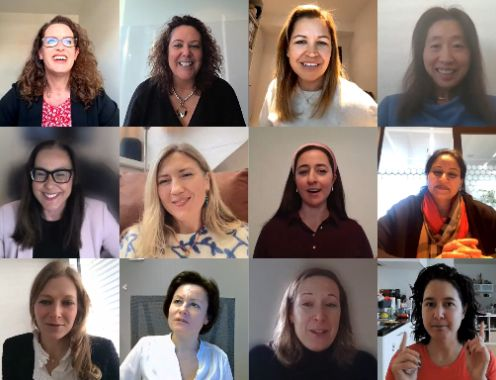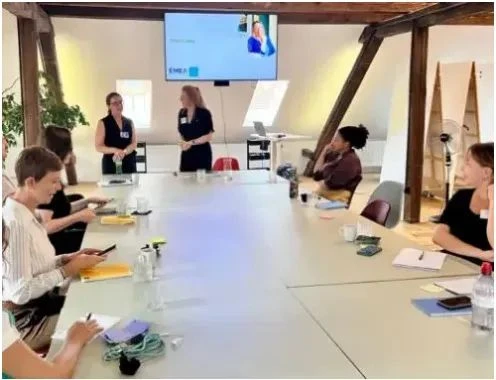- Jobs
- Candidates
- Candidates
- Candidate Services
- Candidate Testimonials
- Employers
- Employers
- Employer Services
- Client Testimonials
- Specialisms
- Executive Interviews
- Podcast
- News & Insights
- News & Insights
- News & Insights
- Events
- About
- Login / Register
Looking for an Employee?
Contact UsLooking for a job?
Social

There's no doubt that 2020 was an unusual year in many ways. In the professional sphere, one of the most significant has been 'The Great Work From Home Experiment’.
For many years, despite the tools and technologies being readily available, many corporate cultures viewed working from home as code for 'Netflix & Chill’. The past year has surely demonstrated that, for most office/computer-based workers, if anything, the opposite applies.
People consistently tell us that their working day has expanded to include their prior commuting time and that, for the majority, their days are longer - accommodating colleagues and video calls across multiple timezones.
Interestingly, people for whom it is an option have also told us how much they have enjoyed the social elements of the occasional day in the office - to the extent that they often feel as if they get less work done while they are there!
We have also identified a third group, who have optimised their use of technology by relocating their WFH to cabins in the mountains - or even entirely different countries!
For us, the big question is this - what happens next?
At some point this year, we hope to return to a situation where groups can congregate more safely and so we are curious to see how corporates respond - whether their suspicion of WFH returns, whether they close offices entirely or look for some sort of meeting-hub hybrid.
Equally, we are also seeing a distinct shift with candidates, who have a far greater expectation of location flexibility than ever before.
Finally, as always, there is the caveat of too much of a good thing - if teams demonstrate that they can collaborate effectively in a distributed manner anywhere in the world, then what is the benefit for a company to continue to employ those teams in a high-cost location?
More insights

What does International Women’s Day mean to You? – IWD 25
Ahead of International Women’s Day 2025, we asked some of the inspirational professionals in our network to share their thoughts on what the day means to them.
Our global team brought together a brilliant group of women to inspire the next generation of female leaders and champion senior professionals with their knowledge, experiences, and insights.
“Most women will have heard phrases like, ‘You can’t do that, you’re a woman’, or ‘There’s no place for women in leadership positions’, but even some men will have heard phrases like, ‘I need you in the office, you can’t focus on your family, you need to focus on work’,” explains Lisa Huybens, the HR Director Europe at Fyffes.
“It’s about having a bond and a sense of unity.”
Kiran Brar, CHRO at Signify, mirrors Lisa’s sentiments: “It’s a great moment to call out our allies, because I don’t think it’s one gender against the other. It’s a moment to thank them for their support, because they play a big role in amplifying our voices and advocating for women at work, but also challenging bias and discrimination.”
Renée Guldemond, Group Controller at Monks, pays respect to those who’ve paved the way for women: “It’s a day to remind ourselves that we need to keep pushing for progress,” she adds.
Inbal Orbach, VP Group FP&A at Lonza, uses International Women’s Day as a chance to reflect on the achievements of women as a whole, but she also looks at her own legacy for other women, her daughter, and children around the world.
Katja Meeuwsen-Nass, VP HR at ASICS, wants to tell younger females in the workplace that whatever they’re doing, “I’m sure it’s really great,” and to inspire growth and confidence in their journey.
Valentina Coco, Senior Organizational Change Expert and Ambassador at EMEA Recruitment, insists that International Women’s Day is not a celebration: “It’s a way to remind ourselves that, it’s 2025, we’re not there yet. Especially for intersectional women, there’s still a huge gap.”
Iryna Klymko, freelance Global Talent Acquisition Partner, reiterates that “it’s not just one day”.
“It’s about thinking about other people, looking back to appreciate and value each other,” she adds.
Thank you to all those who’ve taken part in our #IWD25 series. We look forward to sharing more inspiring and insightful thoughts from global leaders.
Thank you also to Kate Oliver, Associate Director in our HR recruitment division, for championing this initiative.

The Power of Succession Planning, Cost-Conscious Recruitment, and External Providers
Effective succession planning and cost-conscious recruitment are key to business continuity and long-term success. While organizations grapple with the challenges of managing internal talent and controlling recruitment expenses, partnering with external providers can offer you significant advantages.
Succession Planning: Building a Leadership Pipeline
Succession planning is more than preparing for the inevitable leadership change - it's about ensuring your company thrives no matter the disruption.
With a well-designed succession plan and by proactively identifying and developing future leaders early, you can ensure smoother transitions and that the right talent is in place to step into critical roles when that leadership change occurs.
Additionally, when employees are presented with a clear progression path, it not only boosts their loyalty, heightens engagement, and fosters long-term retention but also cultivates leaders who truly embody your company’s values.
However, even with the strongest succession plans, gaps may arise, requiring an external recruitment partner - and that's where EMEA Recruitment come into play.
Cost-Conscious Recruitment: Maximizing Efficiency
Recruitment is often costly, requiring time, resources and financial investment. If you're looking to hire cost-effectively whilst securing top talent, it’s important to adopt strategies that minimize costs without sacrificing quality.
More obvious strategies include internal promotion, reducing onboarding costs and time due to the employee familiarity with company operations, and developing a talent pipeline to avoid last-minute costly hires. But have you considered embracing new technology?..
Leveraging an ATS (applicant tracking system) and AI recruitment platforms can help you streamline the hiring process and reduce manual work, saving you time and money. In May we held a TA Roundtable to explore such tools, to discuss these in detail please feel free to reach out.
The Value of External Recruitment Providers
While there's an upfront cost to using recruitment companies, many external providers offer unique advantages, especially for senior or specialized roles and cost-savings in the long run.
By partnering with EMEA Recruitment, you could benefit from our deep industry expertise, allowing us to top talent quickly. We also provide access to a wider talent pool, including those who may not be actively searching but are open to the right opportunity, freeing you to focus more on internal operations.
In summary, succession planning and cost-conscious recruitment are most effective when supported by external expertise. By integrating these elements, businesses can ensure smooth transitions, achieve cost-effective hiring, and secure long-term success without overspending.
For a more detailed discussion on how EMEA Recruitment can help you build a strong leadership pipeline and drive your business forward, please don't hesitate to get in touch: [email protected]

The Importance of an Up-to-date CV | EMEA Recruitment
When was the last time you updated your resume? Regardless of whether you're actively searching for a new role, passively keeping an eye on the market, or content in your current position, it's important to regularly review and update your CV. You never know when a dream opportunity may come along, and passive candidates often benefit most from being able to apply for a role swiftly.
The summer period in particular is a prime time to reflect on your next career move and strengthen your position for new opportunities as many professionals see this period as downtime. Regularly adding tangible key achievements, polishing any career advancements and generally reviewing your development is a great way to stay ahead and stand out from the competition.
As part of our specialised service at EMEA Recruitment, we offer in-depth Career Consultations covering career development and CV reviews to help our network excel in the market.
If you need help updating your profile, cv consultation, or assistance with mapping out your career trajectory, contact our Procurement, Supply Chain & Operations recruitment team for more information. We're here to support and guide you towards your next move!

The Work from Home Data is Coming In
Nick Bloom, a professor at Stanford University, has been confirming what a lot of our LinkedIn polls have been telling us for some time now: the corporate world appears to have settled into a “three work, two home” split of hybrid work.
He adds that employers commonly recommend that employees spend two days per week working from home, concentrating on individual tasks or attending small meetings, and allocate three days a week to be in the office for larger meetings, training sessions, and social events.
We now know that this flexibility has no effect (positive or negative) on staff productivity. However, it does impact employee costs – the average salary offset in offering hybrid work is 8%. Fully remote work is a different story. Here, we see a productivity loss of 10%.
So, why would companies tolerate this significant reduction?
Cost – there is no need to pay for a place for the person to work or provide any of the office equipment and amenities.
There are several other interesting observations from Nick’s work, but we are really interested in how this affects our clients and candidates.
Additionally, it's important to note that while there can be cost savings, there are also potential costs associated with supporting remote/hybrid work, such as investing in technology, cybersecurity measures, and employee training.
The overall impact can vary depending on the specific circumstances and industry. Prior to implementing hybrid policies, executives and managers should carefully consider the effects of when and how employees engage in remote work.
- How does working from home affect employees in your team?
- Do you work in an environment where you need more freedom, or you could benefit from more human contact?
If these questions are important to you, then get in touch – EMEA Recruitment is at the forefront of people-first recruitment, so we can help you understand the real-world implications of the decisions you make, as a client or a candidate, regarding this topic: [email protected]

The Value of the Handshake
Given we are in the people business here at EMEA Recruitment, it is no surprise that personal relationships and the development of our network is fundamental to everything we do. The best way to achieve this? Traditionally, it was to meet in person, spend quality time face-to-face, and build trust and rapport – but then 2020 happened!
The shift to Zoom, MS Teams, etc. has been articulated more times than we care to remember, and the consensus is that it has brought benefits and conveniences to the workplace that were otherwise unthought of.
But how invaluable is it to meet physically? How powerful is a handshake? Are we programmed to exclusively build deep, meaningful relationships in this way?
With the summer period at an end, we’ve seen an uptick in requests and willingness to connect again in person – whether it’s over a coffee, lunch, or simply an office meeting to visit our clients’ and candidates’ place of work to talk through their latest project or hiring needs. Time and again, we see that this approach solidifies relationships, allows a deeper understanding of any needs, and deeper conversations with added insights.
Yes, the online connection remains fundamental – it may even make up 90% of communications with our network – but taking that remaining 10% to a physical meeting, eyeballing your network, and shaking hands solidifies the relationship more than ever.
Also, if you are meeting people face-to-face for the first time, The Beckman Institute reports that, according to new neuroscience research, people who greeted with a handshake formed a better first impression than those who do not offer a handshake, and performing a handshake reduces the impact of possible misunderstandings during social interaction - something to keep in mind.
If you’d like to book a meeting – in person or face-to-face – with one of our Consultants, please get in touch with Neil, who manages our Procurement, Supply Chain & Operations recruitment team: [email protected]

Embracing Neurodiversity in the Workplace
Last month, we held our second ED&I roundtable, Neurodiversity at Work: For Flourishing People and Organisations, in partnership with Joanna Williams, Founder of Flourish. Keely Straw, Manager of our HR team in Switzerland, reflects on the event...
The roundtable focused on:
WHAT is neurodiversity: in general and at work?
WHY does it matter?
HOW can neuroinclusive workplaces foster individual and organisational flourishing?
It was a very open and honest discussion that started with:
If you don’t understand the language someone is using, you can’t have a conversation.
That line resonated with me quite a lot, especially when considering one of our core values here at EMEA Recruitment – to listen.
It is also essential to understand how we, as a recruiter, can adapt our processes to ensure that we listen and understand those who are talking.
Recruiting neurodiverse talent and creating a neuroinclusive recruitment process is an important step towards building a diverse and inclusive workforce. Here are some tips to help you in this process:
Educate your team: Ensure that your HR team and hiring managers are educated about neurodiversity. Understanding different neurodiverse conditions, such as autism, ADHD, dyslexia, and others, is crucial to making informed decisions.
Remove bias: Implement processes and tools that help reduce bias in your hiring process. This includes using structured interviews, standardised assessments, and anonymised resume screening to focus on skills and qualifications, rather than personal characteristics.
Neurodiversity-friendly job descriptions: Craft job descriptions that are clear, concise, and free from overly complex language. Highlight the skills and competencies required for the role and avoid vague or subjective language.
Flexible application process: Consider offering alternative ways for candidates to apply, such as video submissions or skills assessments, in addition to traditional written resumes and cover letters. This can accommodate candidates with different communication styles and abilities.
Awareness training: Provide training to all staff involved in the recruitment process to increase awareness and understanding of neurodiversity. This can help create a more inclusive and supportive environment for candidates.
Accessible interview formats: Allow candidates to choose interview formats that suit their needs. Some neurodiverse candidates may perform better in written tests, while others may prefer in-person or video interviews. Flexibility is key.
Structured interviews: Use structured interviews with predetermined questions and evaluation criteria to ensure fairness and consistency in the assessment process. This reduces the likelihood of making decisions based on personal biases.
Feedback and communication: Provide constructive feedback to candidates, whether they are successful or not. This can help candidates improve their skills and feel valued in the process. Be clear and specific in your feedback.
Lead by example: Demonstrate your commitment to neuroinclusivity from the top down. When leadership actively promotes and supports neurodiversity initiatives, it sets the tone for the entire organisation.
Creating a neuroinclusive recruitment process is an ongoing effort that requires commitment and dedication.
EMEA Recruitment is embracing neurodiversity. We can help you tap into a pool of talented individuals who can bring unique perspectives and skills to your organisation.
I would be keen to hear your thoughts across the market and understand if you would be interested in future roundtable events, either dedicated to ED&I or broader HR topics.
In addition, I would welcome the opportunity to hear your thoughts on neurodiversity and how this compares with the general market consensus.
Please feel free to contact me directly to see how we can support you: [email protected]
Add New Saved Search
Add Blog Alert
Sign in to your account
Reset Password


Before you continue to the site
Our website uses cookies, including cookies from our partners, to ensure proper functioning and performance, improve your user experience and analyze traffic. Consult the cookies policy.
You can make your choice below and modify them at any time by going to 'Cookies' in the website footer. Your choices are kept for 6 months.
Customize your cookie choices
Below is a list of cookies on our website. You can accept or refuse the use of cookies by purpose (which implies the acceptance or rejection of all cookies concerned by this purpose). Consult the cookies policy.




You can also use your social account to sign in. First you need to:
Accept Terms & Conditions And Privacy Policy